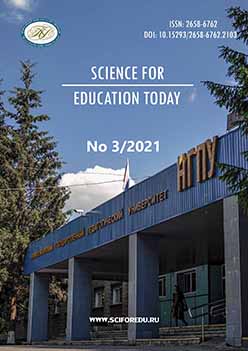Репрезентация мифологем образования одаренных детей в искусстве, научном дискурсе, педагогической практике
Mythologemes of gifted education: Representations in art, scientific discourse, and educational practice
Author(s): Marina Aleksandrovna Maznichenko, Nataliya Ivanovna Neskoromnykh, Anastasia Nikolaevna Platonova, Vita Alexandrovna Fomenko, Anna Leonidovna KhovyakovaSubject(s): School education, Social development, Sociology of Education
Published by: Новосибирский государственный педагогический университет
Keywords: Gifted education; Gifted children; Ideas about gifted education, Mythologemes of gifted children; Representation of mythologemes of gifted education;
Summary/Abstract: The article examines the problem of identifying the key ideas employed by the teachers who are involved in gifted education. The purpose of the article is to reveal the key mythologemes of gifted education and trace their representations in art, scientific discourse, and educational practice. Materials and Methods. In order to achieve the goal, the authors used methods of analysis of scholarly literature, program documents of Russian education, folklore texts, academic texts, literary works and films about gifted children. A questionnaire methodology was used to elicit attitudes about giftedness from teachers working with gifted children. Results. The research findings indicate that mythologemes – sensually ideal projections of rational ideas in representations and images, the absolutization of which by teachers can lead to the formation of unproductive educational scenarios - can act as guidelines for gifted education. The study has revealed the following key mythologemes of gifted education: “Giftedness as an exclusivity”, “Giftedness as destiny”, “Giftedness as a challenge”, “Giftedness as a path to success and achievements”, “Exploitation of giftedness”. Specific examples show their representation in art (folklore, fiction, cinema), scientific discourse, educational practice (teachers' ideas, scenarios of interaction between parents and teachers with gifted children). It is emphasized that absolutization of mythologemes in educational practice leads to the formation and stereotyping of unproductive educational scenarios. Conclusions. The authors conclude that gifted education should be based on the balance between the attitude towards gifted children as holders of a special gift and ordinary children with their own interests and needs, between the development of enhanced abilities and the solution of the problems of moral and social education, between “placing upon a pedestal” and ignorance.
Journal: Science for Education Today
- Issue Year: 11/2021
- Issue No: 3
- Page Range: 59-80
- Page Count: 22
- Language: Russian

